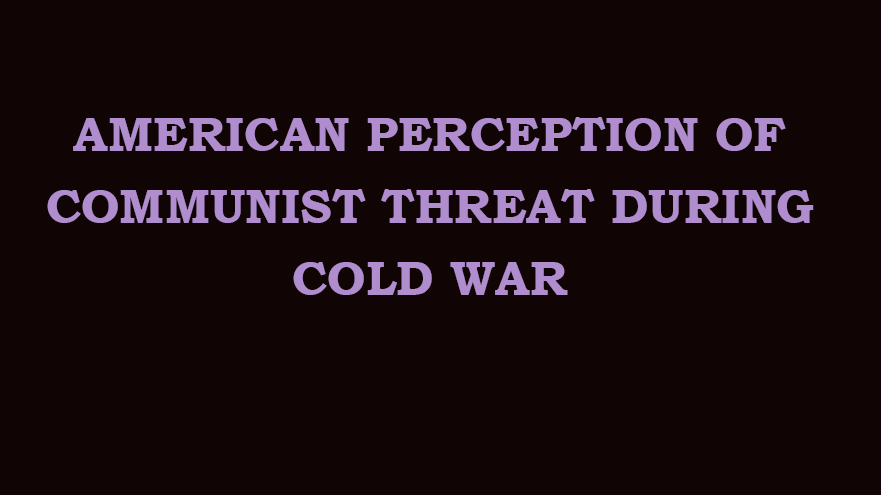
AMERICAN PERCEPTION OF COMMUNIST THREAT DURING COLD WAR
According to the U.S. perception, the fundamental tenet of the Soviet communist thought system was the original communist thesis of the innate antagonism between capitalism and socialism. The Soviet leaders believed in the basic badness of capitalism, in the inevitability of its destruction and the obligation of the proletariat to assist the destruction. They believed that the Soviet Union lived in an antagonistic, capitalistic encirclement. Hence, they also believed that permanent peaceful co-existence of communist and capitalist nations was impossible. They believed that the inherent conflicts of the capitalist world inevitably generate wars. The Soviet leaders believed that there would be a capitalistic intervention against U.S.S.R. which had to be prevented at all costs. They assumed that the conflict between Soviet Union and capitalist powers was inevitable and regarded themselves as the defenders of the communist faith. They believed that the battle between the socialist center and the capitalist center for the command of world economy would finally determine the fate of capitalism and of communism in the entire world. They adhered to the Marxian theory of ultimate destruction of capitalist states by communist states. They believed that it was their duty to prepare Soviet Union for the inevitable conflict. Hence the basic Soviet policies were designed for ensuring victory for Soviet Union in the ensuing struggle between communism and capitalism.
The ultimate objective of the Soviet leadership was the domination of the world. Their immediate goal was the political conquest of the Western Europe. Elimination of any effective opposition to it and extension of their authority were considered essential for the attainment of the objective. The means employed by the Kremlin for this were limited only by considerations of expediency. Hence the soviet policies were directed towards the advancement of the relative strength of U.S.S.R. and reducing the strength and influence of the capitalist powers. Thus, Soviet leaders were increasing their military power and sphere of Soviet influences and were trying to waken and subvert their political opponents by every means at their disposal. However, they were not in a hurry to accomplish their purposes. They were ready to postpone the inevitable conflict in order to prepare Soviet Union for the clash. The resistance of the U.S. was recognized as the major obstacle to the attainment of their goals. For the Kremlin, the U.S. as the principal center of power in the non-Soviet world and the bulwark of opposition to Soviet expansion was the principal enemy whose integrity and vitality had to be subverted or destroyed if it had to achieve its objectives.
As the existence of the idea of freedom was a constant threat to the foundation of the Soviet system, the Kremlin engaged the U.S. in a conflict between its design and the U.S. purpose. The fundamental purpose of the U.S. was to assure the integrity and vitality of its free society founded upon the dignity and worth of the individual. The strategy of the Kremlin was to undermine the complex forces of the U.S. and also of the rest of the “free world” upon which the U.S. power has based. To attain its objectives Kremlin sought to build up overwhelming military force. If the Kremlin were convinced that it could cause the downfall of the U.S. by one conclusive blow, it would seek that solution. Hence there was possibility for a surprise attack against the U.S. and piecemeal aggression against others. Thus, according to the U.S. perception, the Soviet leaders believed that the Soviet power would not be secure unless the way of life of the U.S. society was destroyed. Thus, the greatest single danger to the U.S. security emerged from the will and ability of the Soviet leadership to pursue policies harmful to the U.S.
As Europe was considered as of paramount importance to U.S. security interests, Truman Administration’s policies were aimed at containing Soviet communist expansion in Europe. But the victory of the communists in China in 1949 made the U.S. aware of the vigor of communism in Asia and the urgency of containing it at the earliest. The extension of the communist authority in China was regarded as a grievous political defeat for the U.S. The conclusion of a defense treaty between Soviet Union and China in February, 1950 led Washington to the conclusion that henceforth it would have to deal with the Sino-Soviet bloc. The U.S. thought that if the Kremlin further extends the area under its domination, the U.S. would not be able to assemble a coalition adequate to confront the Kremlin with greater strength. Hence defeat of free institutions anywhere was considered as defeat anywhere. The U.S. believed that international communism could commander the military and economic might of the Soviet Union for its expansionist purposes. The U.S. opposed international communism because its creed and practices were antithetical and irreconcilable with the principles of the U.S. faith. North Korea’s invasion of South Korea confirmed the American view that Soviet Union would resort to war in order to attain its objectives if it thought it had a reasonably good chance of accomplishing them without a large risk to itself. The Chinese entry into the war confirmed the monolithic concept of communism. Thereafter the American thinking and policy making began to be dominated by a tendency to view the world wide “communist threat” in monolithic terms. Korean War marked the globalization of containment. It reinforced the trend towards seeing all communists everywhere as equally dangerous.
Indochina was considered as the area where international communism most vigorously sought to expand. Thus, Indochina began to be perceived as an integral part of the broader struggle between the Soviet dominated communism and the so-called “free world”. The attempt of Ho Chi Minh to evict the French from Indochina was seen as the Southeast Asian manifestation of the communist world-wide aggressive intent. The French resistance to Ho Chi Minh was therefore begun to be viewed as an integral part of the containment of communism in that region of the world. Defense of Indochina was considered as essential for the defense of Southeast Asia. The communist domination of Southeast Asia would critically endanger the U.S. security interests. The loss of any single country of Southeast Asia to communism would lead to a swift submission or an alignment with communism by the remaining countries of the area unless effective and timely counter action was taken. Such an alignment with communism by the countries of Southeast Asia and in the longer term of the Middle East would endanger the stability and security of Europe. Security of Europe was perceived as essential for the security of the U.S.
The primary threat to Southeast Asia would arise from the possibility that the situation in Indochina might deteriorate as a result of the weakening of the resolve of or as a result of the inability of the governments of France and of the Associated States of Indochina to continue to oppose the Vietnam. The U.S. concluded that a Vietminh victory in Vietnam would lead to the communist domination of Indochina. It Indochina goes to communism; Southeast Asia would go under the communist domination. Hence the U.S. believed that for preventing the communist domination of Southeast Asia, a military victory against the Vietminh in Indochina was essential. The French resistance to the Vietminh in Vietnam was considered as a crucial link in preventing the communist domination of Southeast Asia. But the French defeat at Dien Bien Phu resulted in a negotiated settlement which temporarily partitioned Vietnam at the 17th parallel between the communist North Vietnam and the non-communist South Vietnam, at the Geneva Conference of 1954. The U.S. evaluated the Geneva Conference as potential disaster for the U.S. security interests in the Far East. It believed that as result of the Geneva Conference the communists had required an “advance salient” in Vietnam. Hence the U.S. came to the conclusion that the loss of South Vietnam would lead to the loss of Indochina. Thus, an independent, non-communist South Vietnam was considered as a test case of the U.S. determination to uphold its commitments and its capacity to meet the challenges posed by the communist strategy of the wars of national liberation by counterinsurgency warfare. The U.S. believed that the loss of South Vietnam to communism would complicate the task of preventing the spread of communism around the world and would in turn endanger the U.S. security. The U.S. oriented its actions towards this perceived image of the world situation.
AMERICAN FOREIGN POLICY PERCEPTION OF COMMUNIST THREAT FROM SOVIET UNION-1
The Second World War produced U.S. and USSR as the dominant powers in the war-torn world society. Since 1945 the confrontation between U.S. and USSR became the central fact of international life. (For a discussion about the origins of the cold war between U.S. and USSR see W H McNeill. America, Britain and Russia: Their cooperation and Conflict 1941-1946. London Oxford University Press, 1953; H Feis Churchill, Roosevelt and Stalin: The War They Waged and the Peace They Sought. Princeton, N.J. University Press, 1957; D.F. Fleming. The Cold War and its Origins 1917-1950. New York: Doubleday, 1961; L.J. Halle. The Cold War and History. New York: Harper and Row, 1967; M.F. Herz. Beginnings of the Cold War. Bloomington: Indiana University Press, 1966). In this context the foreign policy behavior of the U.S. was determined by its perception of the world situation. America’s perception of the world situation during the post war period was determined by its historical consciousness. During the post war period the American leaders were “moved by a vision of what the global order should be like, that was derived from American values and the American experience (S.D. Krasner. Defending the National Interest. Princeton: Princeton University Press, 1978).
American policy makers viewed the world as divided into a monolithic communist ‘totalitarian’ bloc and the ‘free world’. They considered the communist regime as inherently aggressive. They viewed the communist connected conflicts around the world in an international perspective. Hence any step towards compromise and appeasement of the communists were regarded as disastrous. Hence the American decision makers and the public began to perceive the Soviet behavior, which was motivated by the communist ideology, as a grave threat to the security and welfare of the U.S.(For a sketch of the American Public Opinion in 1945 see J. Lukacs. 1945 Year Zero. New York: Doubleday, 1978. pp. 124-171)
On February 9, 1946 Stalin in a radio address had said that the Second World War broke out as an inevitable result of the development of world economic and political forces on the basis of modern monopoly capitalism. He also contended that the capitalist system of world economy concealed in itself the elements of crisis and war and that the development of world capitalism did not follow a steady and even course forward, but proceed through crises and catastrophes (For details see A.M. Schlesinger Jr. (ed). The Dynamics of World Power: Documentary History of United States Foreign Policy: 1945-1973. New York: Chelsea House Publishers, 1973. Vol. II p.191). Prompted by Stalin’s speech, the State Department asked G.F. Kennan, the American charge d’ affairs in Moscow, to prepare an analysis of the Soviet policy. On February 22, 1946 G.F. Kennan sent a telegram from the Moscow embassy to the Department of State. The telegram was an analysis of the Soviet behavior and a prescription for action by the U.S. The telegram had a significant influence in the evolution of the post war U.S. foreign policy. According to G.F. Kennan’s analysis the post war USSR lived in an antagonistic “capitalistic encirclement” with which, from the Soviet perspective, there could be no permanent peaceful coexistence. Stalin was of the opinion that gradually there would emerge two centers of world significance such as the socialist center and the capitalist center and that the battle between them for the command of world economy would finally determine the fate of capitalism and of communism in the entire world. The inherent internal conflicts of the capitalist world would inevitably generate wars. Here there would be capitalistic intervention against USSR, which had to be prevented at all costs. The Soviet leadership also felt that it would be possible to see the conflicts between the capitalist states for the advancement of the socialist cause. Hence the policies of the Soviet leaders were directed towards the advancement of the relative strength of USSR and reducing the strength and influence of the capitalist powers.
The Soviet efforts would also be directed toward deepening the conflicts between the capitalist powers and exploiting the conflicts by turning them into revolutionary upheavals within the capitalist countries. The Soviet participation in the international organizations would be aimed only at extending Soviet power or inhibiting the power of others. The Soviet policy towards the colonial areas would be directed towards weakening the power of Western nations. The basic Soviet policies would be implemented by agencies for which Soviet government would accept no responsibility. Thus, communists from other countries might penetrate into a wide variety of international organizations and also national associations of the Western powers. Those agencies might work for undermining the general political and strategic potential of major Western powers and also for weakening the power and influence of the Western powers in colonial peoples. The efforts would also be made to set major Western powers against each other. Hence G.F. Kennan concluded that the U.S. was facing a “political force committed fanatically to the belief that with U.S. there can be no permanent modus operandi that it is desirable and necessary that the internal harmony of our society be disrupted, our traditional way of life be destroyed, the international authority of our state be broken, if Soviet power is to be secure” (U.S. Department of State. Foreign Relations of the United States. 1946. Vol. VI. Washington D.C.: U.S. G.P.O. P. 709. (Hereafter cited as FRUS.)
However, he opined that the Soviet power was neither schematic nor adventuristic, and that it was highly sensitive to the logic of forces. Hence if the U.S. and its allies had sufficient forces and made clear their readiness to us it, the Soviet powers would withdraw even without the actual use of force, by the U.S. and its allies (For details see Ibid. pp.696-709).
AMERICAN PERCEPTION COMMUNIST THREAT FROM SOVIET UNION - 2
On March 5, 1946 Winston Churchill warned the Americans against the Soviet intentions of expanding their power and doctrines, saying that “From Stettin in the Baltic to Triest in the Adriatic an iron curtain has descended across the continent. Behind that line lie all the capitals of ancient states of Central and Eastern Europe, Warsaw, Berlin, Prague, Vienna, Budapest, Belgrade, Bucharest and Sophia all these famous cities and populations around them lie in the Soviet sphere and all are subject in one form or another, not only to Soviet influence but to a very high and increasing measure of control from Moscow”
In September 1946, C.M. Clifford at the request of President Truman prepared and submitted a report on the U.S. – Soviet relations. The report contained U.S. perceptions about Soviet communist threat. The report had a very significant impact on the policy formulations of the Truman Administration. According to the report the fundamental tenet of the communist philosophy of the Soviet leaders was that peaceful coexistence of communist and capitalist nations was impossible. The Soviet leaders regarded themselves as the defenders of the communist faith and assumed that conflict between Soviet Union and capitalist powers was inevitable. Hence, they believed that it was their duty to prepare Soviet Union for the inevitable conflict. Hence the basic Soviet policies, both domestic and foreign were designed for insuring victory for Soviet Union in the ensuing struggle between communism and capitalism. Though the Soviet leaders adhered to Marxian theory of ultimate destruction of capitalist states by communist states, they were ready to postpone the inevitable conflict in order to prepare Soviet Union for the clash. The Soviet leaders were increasing their military power and the sphere of Soviet influence and were trying to weaken and subvert their political opponents by every means at their disposal. This Soviet foreign policy which was designed to prepare the Soviet Union for war with leading capitalist nations of the world, posed a direct threat to American society (For details see Ibid pp.268-304).
G. F. Kennan’s article on “The Sources of Soviet Conduct” published in ‘Foreign Affairs’ of July 1947, also contained American perceptions about the Soviet communist behavior. Those perceptions had greatly influenced the American decision makers. According to G.F. Kennan a major premise of the Soviet thought system was its emphasis on the overthrow of its rival power. It placed tremendous emphasis on the original communist thesis of an innate antagonism between capitalism and socialism. The Soviet leaders believed in the basic badness of capitalism, in the inevitability of its destruction and the obligation of the proletariat to assist the destruction. Hence from Moscow’s side there could never be any sincere assumption of a community of aims between the Soviet Union and powers which were regarded as capitalist. Moreover, Kremlin had no compulsion to accomplish its purposes in a hurry. Its political action was like a “fluid stream which moves constantly, wherever it is permitted to move, toward a given goal. Its main concern is to make sure that it has filled every nook and cranny available to it in the basin or world power. But if it finds unassailable barriers in its path, it accepts them philosophically and accommodates itself to them (G.F. Kennan. “The Sources of Soviet Conduct” Foreign Affairs. Vol.25. No.4. (July, 1947) p.575. (Published under the Pseudonym of “Mr. X.”)
The National Security Council (NSC) 20/4 appraised the nature of threats posed by the Soviet communist system to the security of the U.S. According to it, the will and ability of the Soviet leadership to pursue policies harmful the U.S. security consisted the greatest single danger to the U.S. The ultimate objective of the Soviet leadership, as demonstrated by the communist ideology and Soviet behavior was the domination of the world. The Soviet leadership held that the USSR would not be safe until the non-communist nations were so reduced in strength and numbers that the communist influence was dominant throughout the world. Their immediate goal was the political conquest of the Western Europe. The resistance of the U.S. was recognized as the major obstacle to the attainment of their goals. The Soviet leaders pursued their aims by attempting to insert groups under their control into positions of power and influence everywhere. They seized opportunities presented by weakness and instability in other states and used the techniques of infiltration, propaganda and the coercive power of the Soviet military strength. They waged political, economic and psychological warfare against all who were resistant to the communist purpose and attempted to prevent the recovery of and cooperation among Western European countries. Moreover, they were rapidly building up the war potential of Soviet Union and its allies. Hence the U.S. decision makers perceived the immediate purposes and ultimate objective of the Soviet leaders as inimical to the U.S. (for details see FRUS. 1948. Vol. I. Part II pp.663-669)
For the U.S. as far as its global interests were concerned Europe was of paramount importance. Hence the emphasis of the Truman Administration’s policies, aimed at containing the Soviet communist expansion, was placed in Europe. About the reason for it, Acheason said “since our resources are limited, the weight of our effort must be brought to bear in those European countries which are most vital to our national security, where the threat of aggression is most immediate, where our aid will be most effective and where the ability of the economy to stand the financial strain of the military expenditure is the least (U.S. Department of State Bulletin. Vol. 21. August 8, 1949. p.191. (Hereafter cited as DSB)
Hence during 1945-49 periods Indochina was low on the U.S. list of international priorities. As France had an important role to play in the rehabilitation and defense of Europe as an American ally, America was not ready to antagonize the French by opposing their return to Indochina in 1946.



